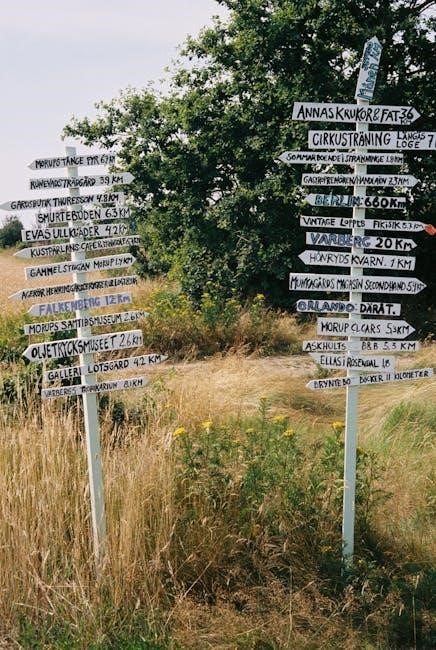Understanding the Role of a Tour Guide
A tour guide ensures a smooth and enjoyable experience by providing local insights‚ handling logistics‚ and promoting safety while fostering cultural connections and memorable interactions for travelers.
1.1. Key Responsibilities of a Tour Guide
A tour guide’s primary duties include planning and conducting tours‚ sharing detailed information about attractions‚ managing logistics‚ and ensuring safety. They must engage visitors‚ handle unexpected situations‚ and provide personalized experiences. Effective communication‚ cultural knowledge‚ and organization are crucial. Guides also assist with bookings‚ handle emergencies‚ and ensure compliance with local regulations. Their role is to create memorable and educational experiences while maintaining group cohesion and satisfaction throughout the journey.
1.2. Skills and Qualities Needed for Success
A successful tour guide must possess excellent communication and interpersonal skills‚ ensuring clear and engaging interactions. Deep knowledge of local history‚ culture‚ and customs is essential for informative tours. Flexibility‚ problem-solving‚ and patience are crucial for handling unexpected situations. Organizational skills are necessary for managing logistics seamlessly. Enthusiasm and a genuine passion for sharing knowledge enhance the experience. Additionally‚ proficiency in using technology‚ like GPS‚ and prioritizing safety are vital for a memorable and secure tour.

Researching Your Destination
Thoroughly researching a destination involves gathering detailed information about attractions‚ cultural practices‚ and historical significance to provide accurate and engaging insights‚ enhancing the tour experience for visitors.
2.1. Gathering Information About Local Attractions
Gathering information about local attractions involves using specific keywords and search tools to identify popular sites‚ hidden gems‚ and unique experiences. This ensures tour guides can provide accurate and engaging details‚ helping tourists discover the destination’s highlights. By filtering search results and verifying credibility‚ guides can curate a well-rounded and appealing selection of attractions‚ enhancing the overall tour experience for visitors.
2.2. Learning About Cultural and Historical Significance
Learning about cultural and historical significance involves understanding the deeper meaning behind landmarks‚ traditions‚ and events. This knowledge enhances a tour guide’s ability to share compelling stories‚ fostering a connection between visitors and the destination. By studying local heritage and consulting experts or historical resources‚ guides can provide accurate‚ engaging insights that highlight the unique identity and legacy of the area‚ enriching the tourist experience.

Preparing for the Tour
Thorough research‚ organizing materials‚ and planning logistics ensure a seamless experience. Collaboration with local operators and continuous updates on attractions and safety protocols are essential for success.
3.1. Creating a Detailed Itinerary
Developing a structured plan ensures a balanced and engaging tour. Include key attractions‚ cultural highlights‚ and practical details like transportation and meal breaks. Adjust timing to accommodate diverse groups and interests‚ while allowing flexibility for spontaneity. A well-organized itinerary enhances the travel experience‚ ensuring smooth transitions and maximizing time efficiency. It also helps in managing logistics and meeting expectations‚ making the tour enjoyable and stress-free for both guides and participants.
3.2. Safety Tips and Emergency Preparedness
Ensure all safety measures are in place‚ such as carrying a first-aid kit and having emergency contact details. Stay informed about local conditions and potential risks. Communicate clearly with tourists about safety protocols and emergency procedures. Be prepared for unpredictable weather and medical situations. Always have a backup plan and maintain communication devices like two-way radios. Prioritize the well-being of tourists to handle emergencies effectively and minimize risks during the tour.

Engaging with Tourists
Engage tourists by fostering meaningful connections‚ using clear communication‚ and adapting to diverse interests. Encourage questions‚ share anecdotes‚ and create a welcoming atmosphere to enhance their experience.
4.1. Effective Communication Techniques
Effective communication as a tour guide involves clear‚ concise speech and active listening. Use engaging storytelling and humor to captivate diverse audiences. Be attentive to non-verbal cues and adapt your language to suit different cultures and ages‚ ensuring all participants feel included and informed throughout the tour experience.
4.2. Managing Group Dynamics
Managing group dynamics involves assessing the composition of your group to tailor interactions. Encourage participation from all members‚ handle conflicts diplomatically‚ and maintain a positive atmosphere. Be adaptable to different personalities and energy levels‚ ensuring everyone feels included. Clear communication and setting expectations can help manage diverse behaviors‚ fostering a harmonious and enjoyable experience for all participants throughout the tour.
Handling Diverse Groups
Successfully managing diverse groups requires adaptability and empathy. Tailor your approach to accommodate varying ages‚ cultures‚ and abilities‚ ensuring all participants feel valued and engaged throughout the tour.
5.1. Catering to Different Ages and Interests
To effectively cater to diverse groups‚ tailor activities to suit various ages and interests. Offer age-appropriate content‚ incorporate interactive elements‚ and balance structured tours with flexible free time. Engage younger participants with hands-on experiences‚ while providing historical insights for adults. Encourage group discussions and ensure accessibility for all. This approach fosters inclusivity‚ keeping everyone entertained and satisfied‚ regardless of age or preference‚ ensuring a memorable and enjoyable experience for all travelers.
5.2. Addressing Special Needs and Requests
Addressing special needs and requests is crucial for an inclusive tour experience. Identify and accommodate disabilities‚ dietary restrictions‚ or cultural preferences beforehand. Provide accessible routes‚ sign language interpreters‚ or wheelchair-friendly transportation when needed. Be prepared to handle medical emergencies and ensure all travelers feel comfortable and included. Flexibility and proactive communication with the group can help meet unique demands‚ fostering a positive and memorable experience for everyone involved.

Using Technology to Enhance Tours
Technology enhances tours through GPS navigation‚ interactive maps‚ and real-time information sharing. Apps and virtual tools provide engaging experiences‚ ensuring efficiency and personalized exploration for travelers.
6.1. Utilizing GPS and Mapping Tools
GPS and mapping tools are essential for tour guides to navigate efficiently. They provide real-time directions‚ pinpoint attractions‚ and help avoid traffic or route closures. These tools enhance accuracy‚ ensuring tours stay on track. Interactive maps can be shared with tourists‚ offering a visual guide of the itinerary. Advanced features like location sharing and voice-guided navigation improve coordination. GPS also aids in tracking group movements‚ ensuring everyone stays connected and informed throughout the tour.
6.2. Incorporating Virtual Tours and Augmented Reality
Virtual tours and AR enhance the touring experience by offering immersive insights. Guides can use AR apps to overlay historical images or videos onto real-world sites‚ bringing history to life. Virtual tours allow tourists to explore locations remotely before or after the trip. These technologies engage tech-savvy travelers‚ provide additional context‚ and create memorable interactions. They also help manage large groups by offering individualized experiences without disrupting the main tour flow.
Managing Time and Logistics
Efficiently coordinating transportation‚ managing schedules‚ and ensuring punctuality are crucial. Clear communication with service providers helps avoid delays and ensures smooth tour operations daily.
7.1. Sticking to the Schedule
Adhering to a well-planned itinerary ensures a seamless experience. Time management skills are essential to cover all attractions without rushing. Guides must balance flexibility with punctuality‚ allowing for breaks and unexpected delays. Clear communication helps set expectations‚ keeping the group on track. A structured schedule also reduces stress‚ ensuring all logistical arrangements like transportation and accommodation run smoothly. This enhances overall tour satisfaction and efficiency.
7.2. Coordinating Transportation and Accommodation
Effective coordination of transportation and accommodation is vital for a smooth tour experience. Guides must arrange reliable vehicles‚ ensure timely arrivals‚ and book comfortable stays. Advance reservations are crucial to avoid delays. Knowledge of routes and lodging options helps in selecting the best choices. Budget considerations and group preferences should also be factored in. Contingency plans are essential to handle unexpected changes‚ ensuring seamless transitions throughout the journey.

Handling Emergencies and Challenges
Tour guides must remain calm and act swiftly in emergencies. Quick decision-making‚ clear communication‚ and prioritizing safety are essential to manage unexpected situations effectively and ensure group well-being.
8.1. Responding to Medical Emergencies
Tour guides must be prepared to handle medical emergencies swiftly. Assessing the situation‚ providing basic first aid‚ and communicating clearly are critical. Prioritizing the well-being of tourists ensures safety and trust. Knowledge of first aid techniques and access to emergency services are essential. Guides should remain calm‚ act decisively‚ and coordinate with local healthcare providers when necessary. Proper training and quick thinking can prevent minor incidents from escalating into larger issues during tours.
8.2. Dealing with Unpredictable Weather Conditions
Tour guides must be prepared for unpredictable weather by monitoring forecasts and having contingency plans. Clear communication with tourists about safety measures is essential. Ensuring everyone is equipped with appropriate gear‚ such as rain ponchos or sun protection‚ is crucial. Guides should remain flexible‚ adapting itineraries to avoid risks while maintaining the group’s morale and safety. Quick decision-making and prioritizing comfort can turn challenging weather situations into manageable experiences for all.

Legal and Ethical Considerations
Understanding local laws and regulations is crucial for tour guides to ensure compliance. Ethical practices‚ such as respecting cultural heritage and maintaining professionalism‚ are equally important for a responsible tourism experience.
9.1. Understanding Local Laws and Regulations
Familiarizing yourself with local laws and regulations is essential for tour guides to avoid legal issues. This includes obtaining necessary permits‚ adhering to health and safety standards‚ and respecting environmental rules. Guides must also stay informed about any changes in legislation to ensure compliance. Understanding these requirements helps maintain professional integrity and avoids potential legal consequences‚ ensuring a smooth and lawful experience for both guides and tourists.
9.2. Maintaining Professional Ethics
Maintaining professional ethics is crucial for tour guides to build trust and credibility. This involves being truthful about tour details‚ respecting cultural sites‚ and avoiding unethical practices like overcharging. Guides should also prioritize fairness‚ ensuring equal treatment of all tourists. Upholding ethical standards fosters positive relationships with communities and enhances the reputation of the tourism industry as a whole‚ contributing to sustainable and responsible travel practices globally.
Continuous Improvement
Continuous improvement involves gathering feedback‚ refining skills‚ and staying updated on trends to deliver better tours and enhance the overall traveler experience consistently over time.
10.1. Gathering Feedback from Tourists
Gathering feedback from tourists helps tour guides identify strengths and areas for improvement. Surveys‚ interviews‚ and online reviews are effective tools to collect insights. Encourage honest opinions on tour content‚ communication‚ and overall satisfaction. Analyzing feedback allows guides to refine their services‚ enhance the quality of tours‚ and ensure memorable experiences for future travelers. Regular feedback loops foster continuous growth and improved customer satisfaction.
10.2. Updating Knowledge and Skills
Continuous learning is essential for tour guides to stay informed about local attractions‚ historical facts‚ and cultural trends. Attend workshops‚ seminars‚ and online courses to enhance expertise. Stay updated on new technologies‚ such as GPS and virtual tours‚ to improve tour delivery. Regularly research local changes‚ like new attractions or updated regulations‚ to provide accurate and engaging information. Practical application of new skills ensures a high-quality experience for tourists.
Promoting Sustainability
Encourage eco-friendly practices like reducing waste and supporting local businesses to foster sustainable tourism‚ ensuring a positive impact on the environment and local communities while traveling.
11.1. Encouraging Eco-Friendly Practices
Tour guides play a crucial role in promoting eco-friendly tourism by educating travelers on minimizing waste‚ conserving resources‚ and respecting wildlife. Encouraging reusable items and responsible behavior helps preserve destinations for future generations. Guides can also recommend eco-certified accommodations and activities‚ fostering a culture of sustainability among tourists. This approach not only benefits the environment but also enhances the travel experience by connecting visitors with nature and local traditions in a responsible way.
11.2. Supporting Local Communities
Tour guides can significantly contribute to local economies by promoting local businesses‚ artisans‚ and services. Encouraging visitors to dine at family-run restaurants‚ shop from local markets‚ and engage with community-based activities fosters cultural exchange and economic growth. By highlighting the importance of sustainable tourism‚ guides help preserve traditions and empower communities‚ creating a mutually beneficial relationship between travelers and locals that enriches the travel experience for everyone involved.

Leave a Reply
You must be logged in to post a comment.